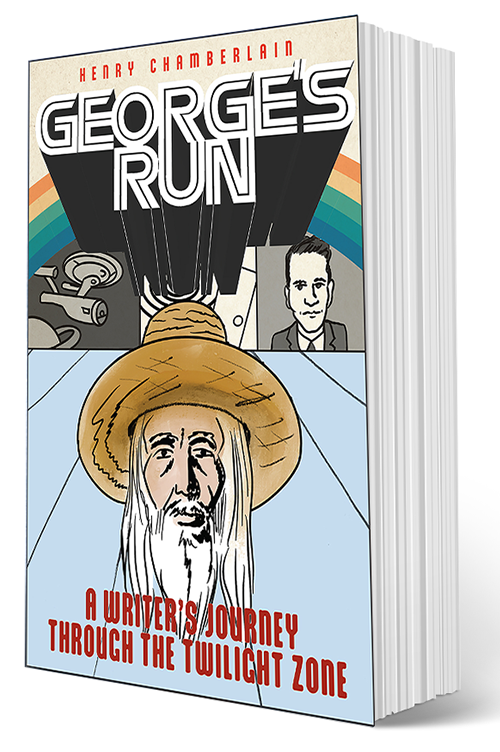Alex Robinson, a very well respected cartoonist, known for his graphic novel, “Box Office Poison,” published by Top Shelf Productions, recently contributed a moving four-page comic to the comics anthology, “Digestate,” edited by J.T. Yost, and published by Birdcage Bottom Books. The theme in that book is food and eating. Mr. Robinson’s piece is about his eating disorder. He describes it and explains how he deals with it. He uses the comics medium to great effect to discuss a complex issue. It’s not often enough that we, as a society, discuss eating disorders but we’re making progress. Add Mr. Robinson’s, “That Peanut Butter Kid!” to a healthy opening up on this subject.
I had the honor to interview Alex Robinson regarding his comic about his eating disorder through e-mail. Here is that interview:
Henry Chamberlain: You recently contributed a piece entitled, “That Peanut Butter Kid!” to the comics anthology, “Digestate,” edited by J.T. Yost, where you are publicly candid about having an eating disorder for the first time. What motivated you to participate and create such a personal work?
Alex Robinson: It’s funny because I told J.T. I was going to contribute but it was only afterwards that I reread the e-mail more closely and realized it was about food. When I look back I remember that a friend of mine did a Facebook post where he talked about being the victim of sexual abuse and the honesty of that really hit me, since I never knew that about him. I think that bravery inspired me to talk about some of my own issues.
It’s also interesting to me because it’s only recently that I started framing my own problem as an “eating disorder” since I think that makes most people think of anorexia or bulimia.
HC: Eating disorders are mentioned more in the media but the actual condition remains something of a mystery for the general public, and even for those dealing with it firsthand.
Do you think the media can play a helpful role in gaining a better understanding of eating disorders?
AR: I would think so. I remember being a kid and there was a made-for-TV movie about a girl with anorexia—which at the time was just coming into the public eye, I think—and the commercial showed a father angrily begging his daughter to just eat something. For a moment I was struck because this was as close as I’d ever seen to someone on TV talking about a problem that, as far as I knew, I was the only one who had. When I watched the movie I was very disappointed that it was about girls worried they were too fat, which didn’t seem at all connected to my own problem, so I still felt alone.
It’s tough because eating disorders are one of those problems where unless you or someone you love is suffering through them it seems dumb—“Just eat something.” George Carlin had that joke about only in America could people develop a mental disorder where they refuse to eat. It’s tough to make sympathetic if you haven’t experienced it first hand. For all of our claims otherwise, we’re generally not sympathetic to mental illness in America.
HC: Of course, eating disorders manifest in different ways. From your viewpoint, what do you see as healthy steps towards recovery?
AR: I can only speak for myself and for me it was years of therapy. I was lucky to find a woman who was and continues to be patient and prod me along.
I think just doing the story was also surprisingly therapeutic. It’s kind of a cliché but exposing your shameful secrets really does lift a burden off of you, if only because it’s one thing you don’t have to worry about anymore. I think it was within a month or two of completing the story that I stopped eating peanut butter altogether. I haven’t had peanut butter in six months, which is amazing considering that I probably never went more than a few days without it before.
HC: In “That Peanut Butter Kid!” you say that you’re concerned that you may come across as glib but the piece is truly nicely balanced. I’m sure you would agree that humor can be very good medicine.
AR: Since it was the first time I’d talked about it publicly I couldn’t trust my own judgment as to the tone. I’m inclined to be funny, especially when I’m nervous, and I also didn’t want to bring people down. I was trying to just explain what life was like for me and not be self-pitying about it.
HC: Would you consider turning “That Peanut Butter Kid!” into a graphic novel? It certainly has all the elements that would make for one.
AR: When I completed the story I found it very therapeutic and the thought crossed my mind to just keep going—a sort of stream-of-conscious rumination about different aspects of my life—but I was also very nervous about the story going public. I figured an alternative comics anthology was enough “under the radar” that it was like going public without going too public.
I also don’t think my life is all that interesting, otherwise.
HC: Any final thoughts or new projects that you are working on?
AR: I’m about halfway done with a new graphic novel that I still don’t have a title for. It’s about a group of guys in their late 30s who are sort of dealing with the issues of midlife—marriage, kids, career, etc. Fun stuff! I’ve been talking with Top Shelf about digitally serializing it so hopefully that might begin later this year.











Pingback: Comics A.M. | Turkey lifts ban on thousands of books (and a comic) | Robot 6 @ Comic Book Resources – Covering Comic Book News and Entertainment
Pingback: The Six Pack Abs Myth |
Pingback: Interview: J.T. YOST |